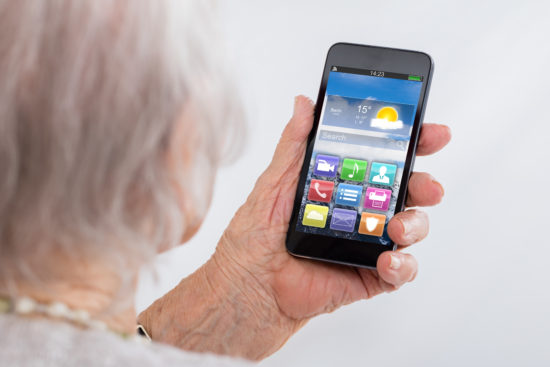Elderlink Home Care, Inc. would like to congratulate Millie D. our Caregiver of the Month for June, 2020! Millie has been working with Elderlink for over 3 years and has had many long-term clients with us! She was so very happy and excited to receive the award. Millie initially became a caregiver because of her mother and other relatives of hers that she helped care for. She said she is very passionate about what she does and really enjoys it. She doesn’t have much free time but tries to spend whatever free time she does have, relaxing! Congratulations again Millie, thank you for being such a valued member of our caregiving team!
Make an Appoinment
LATEST NEWS
We would like to congratulate Albert Barbar, our Caregiver of the Month for May, 2020! Albert has been a caregiver for 17 years (with Elderlink for 6 years) and has worked with many of our clients long term. Each client says wonderful things about him and the care he provides. Albert said he never dreamed of entering this field, but he was working in New York after 9/11 and had a friend who recommended he apply to work as a caregiver in a facility and he did. Albert says he found an ‘extreme passion’ for caregiving during this time and ‘fell in love with helping other people’. He says this field has taught him to be professional, proactive and become an excellent listener. Albert says he loves being a caregiver with Elderlink and hopes to work with us forever so he can have the opportunity to help even more people! Congratulations Albert, we are so happy to have you on the Elderlink team!
Congratulations to Aziz Nurmatov, our selected Caregiver of the Month for April, 2020! Aziz was so happy to receive the Caregiver of the Month award and said it means so much to him! Aziz has been a caregiver for roughly 5 years and has been with Elderlink for about a year. His clients always have such nice things to say about him. Aziz has lived in Colorado for about 10 years. When he isn’t working, he enjoys going to the mountains to ski and also enjoys working on cars. When asked why he enjoys being a caregiver, Aziz said that he appreciates the relationships that are built, getting to spend quality time with his clients and knowing he is helping to make life easier for someone else. Congratulations Aziz, keep up the good work!
Elderlink is happy to congratulate our Caregiver of the Month for April, 2020, Ezabel O. Ezabel has been with Elderlink for almost 15 years! During that time she has worked with nearly 80 Elderlink clients and we are so grateful to call her an Elderlink caregiver! Ezabel said she absolutely loves being a caregiver and working with Elderlink. Her favorite thing about Colorado is the weather, she says even on the snowy days, it normally isn’t long until its sunny and beautiful outside. Congratulations Ezabel!
Congratulations to Jerry S., our Caregiver of the Month for February, 2020! Jerry has been with Elderlink for over 10 years now and has had many long term clients with us! Jerry has worked as a stock broker and real estate broker in the past and has been caregiving for about 10 years. Jerry has lived in Colorado since ’73 and got into caregiving because he really wanted give something back into the community and feels like he has really grown into his role as a caregiver. He feels its a privilege and an honor to be with someone at this stage in life. Congratulations, Jerry! We are so happy to have you on the Elderlink team!
Congratulations to Bobbie T., our caregiver of the month for January, 2020. Bobbie has been working with Elderlink as a caregiver off and on since 2007! She has lived in Colorado since she was child and enjoys fishing. Bobbie says the things she enjoys the most about being a caregiver are making her clients happy and being able to listen to all the knowledge her clients have to share. She also enjoys shopping with her clients. Congratulations Bobbie and thank you for all you do for your clients and Elderlink! The caregiver of the Month award is selected by the office staff (Alyssa, Becky, Jennifer, Karen, Ronni & Robin). We work with over 500 caregivers throughout the Denver area – being selected is a huge honor! The award is given to caregivers whom we feel go above and beyond for their clients, follow Elderlink policies and procedures, are genuine team players, and helpful to the office staff.
Start Thinking About Home Care Considering home care for your aging parent(s) can be frightening. It’s a personal experience, that is often uncomfortable to talk about. If it’s been a while since you last saw your aging parents, you may be shocked at how your mother’s health status has changed in such a short time. Is she losing weight, does she appear unkempt? Did you always have to shout so loud for your dad to hear you? At some point, you will be struck with the realization that your parents are getting older. It’s time to broach the subject of ‘what happens next’ and to start making plans for the future. Home Care is intended to help you and your parents so that the uncomfortable moments don’t have to be uncomfortable. Why is it difficult for children of aging parents to discuss the future? Although each situation is different, most of us have difficulty with the sudden reversal of roles, or we may feel like we are meddling in our parents’ private lives. There may also be a reluctance to admit that the inevitable has happened; that our parents have gotten old. Yes, it’s a tough discussion to initiate, but remember it is never too soon to discuss the future with your aging parent. It is much easier to make plans before a crisis, such as a fall or a stroke catches you off guard. It’s much better to have a plan in place early, rather than scrambling around at the last moment. Although this looming conversation may feel like one of the hardest things you’ve ever had to do, don’t let your parent(s) sense that. Plan your approach and timing carefully and you may be pleasantly surprised. Chances are if the subject is on your mind, it has been on your parents’ mind as well. Start Talking About Home Care Just the idea of having this discussion with your parents may be enough to increase your blood pressure, but no one ever said that discussing your aging parents’ future would be easy. Most of us are used to having our parents ask the questions. Yet now, as your parents’ current or potential caregiver, it’s up to you to start asking the difficult questions. It’s always best to sit and discuss with the parent the plan to hire homecare before actually doing so. If possible, pick a time when there is no immediate crisis and when your parent is emotionally and physically up for this discussion. Explain that while you enjoy being with your parent(s) and being able to help, there just aren’t enough hours in the day to be able to take care of their needs correctly and still have quality time together for visiting. Parents may initially feel abandoned. like you don’t care. The parent may also feel like they have been such a tremendous burden on you that you want to push them off on someone else. Everyone will react differently to the idea. Some will be very accepting, others will argue, some will do the guilt trip thing and others will just say no! If the reaction you get isn’t positive, explain again why it is that you are considering live-in home care as the best living situation for them, explain your problem and then ask your parent(s) to come up with alternative ideas. to help you! Parents are often willing to do something to benefit their children, which they would not be willing to do for themselves. It’s best not to bombard parents with a list of things they are doing “wrong” or a list of things that they are unable to do, instead a simple sentence like, “Mom, I am concerned because you are not eating properly and are losing weight,” will get a better response. Parents tend to accept the idea better if it is viewed as a luxury or benefit, something they deserve, rather than something being forced upon them because they can no longer care for themselves; “Mom, you deserve someone to come in and prepare some good meals for you,” is more likely to be met with a positive response. It can be frustrating and it may take some time, but eventually, most will come around. It’s best not to force the issue, but to be persistent. Remember to Listen to Their Concerns About Home Care While it’s a good idea to plan the topics you’d like to cover and the decisions and conclusions you’d like to reach, try not to make the conversation appear too prepared and scripted, this could frighten your parents. Remember – this is meant to be a conversation between two people. Your parents will likely be more accepting of a new plan if they feel they had a part in making the decision. Be prepared to listen to what your parents have to say – they may already have some pretty clear ideas of their own. Here are some tips and pointers to help you try and make the conversation go smoothly: Don’t let your questions appear as though you are interrogating. If you are sensitive and show genuine interest and concern, chances are your loved one will open up to you. Be supportive and empathetic, not judgmental or accusatory. The last thing you want to do is appear threatening and put your parent on the defense. Ask open-ended questions to give your parent an opportunity to share their opinions and wishes with you. Have an open mind regarding your parents’ decisions and wishes, even if you find it hard to agree, remember it is their lives you are discussing. Don’t overwhelm with too many questions. It may take several discussions over a period of days or weeks to cover all the areas you feel are important. However, when wrapping up a conversation, be sure to make a definite time for the next discussion or there is a danger the subject will get brushed under the rug. This is a good time to share your
Get the Senior in Your Life Comfortable with Today’s Technology with These 4 Concepts There is a popular, albeit inaccurate misconception that most baby boomers and seniors are computer illiterate and do not care to try and adapt to today’s changing technology. This simply isn’t true! Technology has done a lot to assist and enhance the lives of seniors; and seniors are eager to learn! The number of seniors using the internet and related tech devices is increasing. Four-in-ten seniors are now using internet and own smart phones. That is more than double the number in 2013 (A Place for Mom.com). If you’d like to help your loved one jump on the technology train, begin with these 4 technologies: Ipads, Tablets and Kindles This is definitely the place to start! If the senior in your life likes to read, look into getting them a Kindle. The Amazon Kindle is an e-reader and enables its user to purchase and download e-books, e-magazines and newspapers. In addition, many other applications and games can be downloaded on to the Kindle. Fonts can be increased to help seniors with poor vision. This is also a great way to get them comfortable browsing the internet on a handheld device. Skype Skype provides video chat using the internet. It is something every senior should really get familiar with! It makes connecting with family, friends and loved ones very easy and can provide social interaction that many seniors are missing. In addition, the connections are in real time, making it a great tool to include them in events they are not able to be a part of due to distance or physical limitations. There have been stories about long-distance loved ones being able to ‘attend’ weddings via Skype! Skype is easy to use and can be installed on any computer and most handheld devices. Computer and Video Games Keeping the senior’s mind sharp is important as they age. Video games have been proven to improve cognition, mental agility and even physical health and well-being! You can purchase a video game console (such as an Xbox or Nintendo Wii, however, there’s thousands of games that can be downloaded on a tablet or smart phone. Playing a game they enjoy can also help seniors with boredom and isolation. Smart TV’s For those of us who utilize streaming services such as Netflix and Hulu, we are aware that traditional TV is quickly becoming outdated! Nowadays, you can buy a TV that has streaming services pre-installed, allowing the owner to watch millions of programs with the push of a button! If your loved one lives alone and spends a lot of time watching TV, they could possibly be getting bored watching the same programming over and over. A Smart TV is an excellent way for them to experience some newer, current programming, different than what they are used to. Don’t leave your senior loved one behind when it comes to technology. You may think they have no desire to learn new technologies and participate, however, there is a good chance you are wrong. Chances are, they will appreciate the opportunity to connect with you and experience the new technology the world has to offer. If you or a loved one needs assistance in their homes, please call Elderlink Home Care, Inc. at 303-734-0641, we are here to help!
What Is Home Care? Simply put, home care is when an individual such as a nurse, physical therapist or caregiver come into a person’s home to assist them. There are two main types of home care: home health care and home care. Home health care refers to medical care provided in the home, such as skilled nursing, physical therapy or occupational therapy. This care is provided by a licensed individual and is typically provided short term after a hospitalization or surgery and often times is covered by Medicare. Home care is the term used to define assistance with what is commonly referred to as ‘ADLs’ – activities of daily living. This type of care is provided by a caregiver or home health aide and they are not required to hold any specific certification or license. What Type Of Assistance Will I Receive With Home Care? Caregivers from a non-medical home care agency, such as Elderlink Home Care, Inc., provide assistance with the activities of daily living – routine things we all do, every day, but often get more difficult with age or illness. These include things such as assistance with bathing, personal care and grooming, meal preparation, medication reminders, transportation, companionship, and light housekeeping, to name a few. Home care agencies typically provide short term assistance before/after surgery, or will provide respite care so family members and primary caretakers can have some time off. How Much Does Home Care Cost? The cost for non-medical home care varies depending on if you are setting up care on your own privately, are using the help of an agency, and the specific needs of the person receiving care. Most agencies charge an hourly rate and have minimum amounts of time that must be scheduled. Elderlink Home Care, Inc. shops Denver area agencies regularly. Currently, the majority of agencies charge on average $27 – $30 per hour. Because Elderlink has been in business for over 30 years, we have perfected the art of home care and offer our clients a unique service that allows our clients to take advantage of our extremely competitive rates which are currently $19 – $25 per hour. Will My Insurance Cover Home Care? Medicare and other traditional health insurance typically do not cover home care. If the person receiving care has long term care insurance, it will usually cover non-medical home care. Otherwise, most home care agencies and associated costs are private pay. There are some government benefits available for qualifying veterans to help fund the cost of home care. Reverse mortgages are also a good way to secure funding for home care. How Do I Choose A Home Care Agency? There are many choices when it comes to selecting a home care agency to work with. We recommend researching your options before the need arises. This way, you have time to call several different companies, ask questions and select the one you feel the most comfortable with. It’s also a good idea to ask close friends or trusted professionals (such as your doctor) if they have any recommendations for you. The best testament to a company is a satisfied customer! They might be able to narrow down your search significantly. Home care is a very personal decision and you want to choose an agency that not only meets your needs, but one that makes you feel good and at ease throughout the entire process. There is a lot of information out there when it comes to home care. These are just a few of the most common questions asked when discussing home care. If you or a loved one would like to discuss home care or arrange for an in-home consultation, please call Elderlink Home Care, Inc. at 303-734-0641.
Spring is the perfect time to get out and start exploring! Ageless Outings is a guidebook for planning your daytrips – to museums, art galleries, working farms, nature centers, local history centers and more. Over 1000 copies of the original books have been sold, and an updated edition was published in April, 2018. We’d like to share a few ideas with you! Iris4U Garden is open seasonally (mid-May until mid-June). Wandering the aisles of this beautiful garden is a great way to spend some time. Its very easy to get to and the staff is very friendly. 2700 W. Amherst Avenue, Denver, CO Cussler Museum is only open from May to September, so now is the time to go. You may have heard of the famous author Clive Cussler. His books feature unique and exotic automobiles, and there are over 70 of these vehicles housed in Arvada at his family run museum. It’s a beautiful collection and perfectly displayed. 14959 W. 69th Avenue, Arvada, CO Breckenridge Brewery in Littleton provides a comfortable setting, a convenient location, and a unique building they call “The Farmhouse”. It is very close to the Platte River, which has plenty of biking and pedestrian trails. Make an afternoon of it! Take a stroll on the river, grab a coffee and a treat at Nixon’s outside of Hudson Gardens, then make your way to the Brewery for a tour, tasting, and lunch. Outdoor and indoor seating is available with large grassy areas and mountain views. 2920 Brewery Lane, Littleton, CO For more ideas, the Ageless Outings book can be purchased at http://www.outandaboutcolorado.org or call 720 398 8945.










